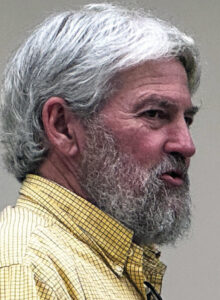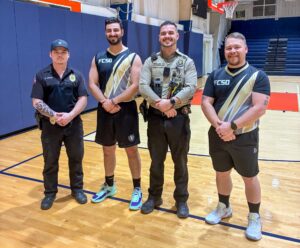PROGRESS 2024 Veteran Spotlight – Bill Jackson
Jackson was sworn in and put on a troop train to St. Louis, Mo. From there he took a bus to Fort Leonard Wood, Mo., for basic training.
“When we got off that bus at Fort Leonard Wood, Missouri, the drill sergeant said, ‘This is one rule you don’t violate: There’s only one color here, and that’s Army green.’ And as far as I know, there was never a problem. Everybody knew what he was talking about,” Jackson said.
Other things, on the other hand, did pose problems – like the unforgiving summer heat, for one. “It was pretty tough. It was in July and August, and Missouri is pretty warm at that time,” Jackson remembers. “It was physical training and then basic infantry training.
“After the first or second day, I was having second thoughts,” Jackson admitted. “But it didn’t matter; you were there.”
Jackson’s eight-week AIT for military police training was at Fort Gordon, Georgia. It included driver’s training; he and several others were tasked with teaching some of their fellow soldiers. “A lot of the guys I was with didn’t even know how to drive, especially stick shifts,” Jackson said. Aside from the hands-on components, there was plenty of classroom study. “A lot of the classroom training entailed weapons training and also the military code of justice. We had to enforce it, so we had to know it.”
Jackson said he and others who were training to become MPs were largely held to a different standard than some of the other soldiers. “They were pretty strict on military policemen,” he said. “You were expected to adhere to certain rules – whether on or off duty.”
It wasn’t long before the training stage was over, and they were issued their green towels and green underclothes – their ticket to Vietnam. After 30 days leave, Jackson was flying out
“Most everybody of eligible age was being drafted or going in the service of some sort – all the friends I grew up and ran around with,” Jackson said. “At that time they were sending body bags home every night on the news.” His parents “weren’t thrilled” he was deploying, “especially my mother, but it was just something you did. You didn’t talk too much about it.”
From leave to Fort Dix, New Jersey, to Anchorage, Alaska, to Tokyo, Japan, to Bien Hoa Air Base, Vietnam. Jackson said he wasn’t really scared – but he’s not sure the full reality had sunk in. He was assigned to three different base camps during his year in Vietnam, during the Tet Offensive – which time period “played an important role in weakening U.S. public support for the war in Vietnam,” according to the Department of State Office of the Historian website.
Jackson and his fellow MPs “escorted convoys, mainly,” Jackson said. “The military moves big amounts, and we would escort convoys, from Bearcat North of Saigon all the way to the Mekong Delta on the south end of the Peninsula.”
While at Dong Tam Base Camp, “we were mortared 80 days in a row,” Jackson said. “When the siren went off, if you were asleep, you’d hit the floor … You could hear them whistling when they came in. If you were working, you’d try to get into a bunker somewhere.”
Jackson remembers ships would come up the Mekong River bringing supplies and unload them there at Dong Tam. “There was nothing else around us but jungle,” Jackson said. “We’d do patrols, and if you had base camp duty, there would be two. If you went outside the base, it had to be two or three.”
MP duties also included tasks like guarding some of the small POW camps – 12 hours on, 12 hours off, seven days a week. “We had one at one base camp who tried to escape – but he didn’t make it,” Jackson said.
He was also assigned to the Tan Canh base camp for a few months, also located in the Mekong Delta.
“It was really pretty town. It had a lot of these Buddhist pagodas and stuff in it,” Jackson recalls. “There was an airstrip there, too,” used for bringing in supplies and moving personnel around.
Jackson’s term of service, as for most, was one year. “After eight or nine months, you started looking forward to coming home,” he said. He still remembers the process of getting ready to come back home – turning in his weapon, going through check-out procedures, taking a Jeep to the airbase and boarding the plane. “I felt great. I was ready to leave.”
To Guam. To Hawaii. To California, where the all enjoyed a good meal and a haircut and were issued new uniforms. “We were so excited to be home,” Jackson said. He caught a cab to the San Francisco airport and flew to O’Hare, Chicago.
“Walking through the terminal a O’Hare Airport, there was nothing friendly about it,” Jackson said. “People would yell at you and stuff like that. We didn’t get much news over in Vietnam – we didn’t know it was that bad. A lot of guys were totally not prepared for it. That was a lot of turmoil then.
“I just went on. I was just glad to get my feet on America soil and glad I didn’t have to go back.”
He had 30 days of leave and then had to report to Fort Lee, Virginia, to complete his term of service. “I was assigned to the 36th Civil Affairs Company,” Jackson said. There was little military policing to do, so he asked to be transferred to an MP company – which he was – for the remainder of his service.
“It was fine. It was more spit and polish – you had to be on your toes with your uniforms and stuff like that,” Jackson said. “Vietnam was more lax because in the rainy season it was mud, and the rest of the time it was dust and dirt. You could not stay clean over there, the way you could here. We stayed dirty over there.” Jackson said he enjoyed getting to be clean for a change.
As his military commitment began to draw near its end, Jackson – and fellow MPs – started to be recruited and receive job offers from local police departments. He accepted a job in Rico County, Virginia, and was granted a 90-day early release from the military. “By that time I’d made sergeant, so it wasn’t too hard to get a job,” Jackson said.
He went through 12 weeks at the police academy, and during his employment in Virginia, he met and married his wife Denna.
In 1975 the couple moved to Franklin County, Alabama. Jackson had lived in Phil Campbell for a while during his school years and graduated from Phil Campbell High School. He’d visited on vacation and felt there were more opportunities here. Denna was reluctant at first, but they made the move.
From there Jackson worked stints at the Franklin County Sheriff’s Office and Ford-Grissom Motor Company before joining Citizens Bank in 1982. He retired from the bank’s successor, CB&S Bank, after 30 years with the company.
The Jacksons have one daughter, Amy. She and husband Brian Bragwell have one daughter, Emma Claire, 23.
In Jackson’s retirement he’s enjoyed his time building antique cars. He also used to bass fish a lot, even traveling around the nation to enjoy the best spots.
When Jackson reflects on his military service, “I think it instilled some discipline. You still remember certain things you were taught,” he said.
He praised this area for its support of veterans. “We’ve got a lot of support out of the community, especially when we have a veterans program,” he said. “Russellville is a good veterans town.”







